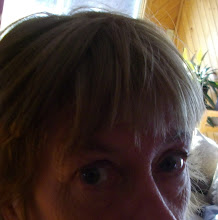by Michael Pollan
The New York Times Magazine, April 20, 2008
~~~~
"Why bother? That really is the big question facing us as individuals hoping to do something about climate change, and it’s not an easy one to answer. I don’t know about you, but for me the most upsetting moment in “An Inconvenient Truth” came long after Al Gore scared the hell out of me, constructing an utterly convincing case that the very survival of life on earth as we know it is threatened by climate change. No, the really dark moment came during the closing credits, when we are asked to . . . change our light bulbs. That’s when it got really depressing. The immense disproportion between the magnitude of the problem Gore had described and the puniness of what he was asking us to do about it was enough to sink your heart."
I can relate exactly to the discouragement he's talking about. Reducing, reusing, recycling and composting have become second nature, my car is energy-efficient and driven only when necessary, and yes, most of the bulbs in the house are fluorescent. My diet more and more consists of whole foods, locally and sustainably grown (to the extent that that's possible during the winter). And as Michael says, there is some virtue in reducing my personal footprint, and the feeling of doing something positive, however small, is incredibly satisfying. But still, with the global environmental situation deteriorating at an ever-increasing rate, I wonder if it's really making any difference other than for me personally.
But that personal connection is precisely where it has to start. Wendell Berry believed that nothing was likely to change until we healed the split between what we think and what we do...
For Berry, the “why bother” question came down to a moral imperative: “Once our personal connection to what is wrong becomes clear, then we have to choose: we can go on as before, recognizing our dishonesty and living with it the best we can, or we can begin the effort to change the way we think and live.”
Michael offers some really good suggestions for how we might answer the "why bother?" question, but the one he is most passionate about is growing some - even a little - of our own food.
Measured against the Problem We Face, planting a garden sounds pretty benign, I know, but in fact it’s one of the most powerful things an individual can do - to reduce your carbon footprint, sure, but more important, to reduce your sense of dependence and dividedness: to change the cheap-energy mind...
But there are sweeter reasons to plant that garden, to bother. At least in this one corner of your yard and life, you will have begun to heal the split between what you think and what you do, to commingle your identities as consumer and producer and citizen. Chances are, your garden will re-engage you with your neighbors, for you will have produce to give away and the need to borrow their tools. You will have reduced the power of the cheap-energy mind by personally overcoming its most debilitating weakness: its helplessness and the fact that it can’t do much of anything that doesn’t involve division or subtraction. The garden’s season-long transit from seed to ripe fruit - will you get a load of that zucchini?! - suggests that the operations of addition and multiplication still obtain, that the abundance of nature is not exhausted. The single greatest lesson the garden teaches is that our relationship to the planet need not be zero-sum, and that as long as the sun still shines and people still can plan and plant, think and do, we can, if we bother to try, find ways to provide for ourselves without diminishing the world.
Here's the link again to the full article. I find Michael Pollan a delight to read. He shares his truth with compassion and humor and I like how he talks more about soul and spirit than about science.
And in case you think it's too complicated, too much trouble, you don't have room, blah blah, here are some pics of my "world's smallest organic vegetable farm" I started a couple of years ago. I had to move it up onto the deck because critters ate most of the produce when it was down at ground level.

 Strawberries, cucumber, broccoli, carrots, tomatoes, beets, red potatoes, snow peas, sugar snap peas, pattypan squash - green onions, garlic and herbs are on the back steps.
Strawberries, cucumber, broccoli, carrots, tomatoes, beets, red potatoes, snow peas, sugar snap peas, pattypan squash - green onions, garlic and herbs are on the back steps.Pattypan squash just starting to form - each one begins as a huge yellow flower.
This year will see more of the above and some new varieties - Pak Choi, romaine lettuce, spaghetti squash (all dwarf varieties suited to containers) and Blue Curled Scotch Kale. Purple Ruffles basil, cilantro and the first crop of broccoli have started indoors, will plant out late May. Might go totally wild and crazy and plant some corn too. Take that, Monsanto!
~~~~
Whether we and our politicians know it or not, Nature is party to all our deals and decisions, and she has more votes, a longer memory, and a sterner sense of justice than we do.
- Wendell Berry
~~~~


